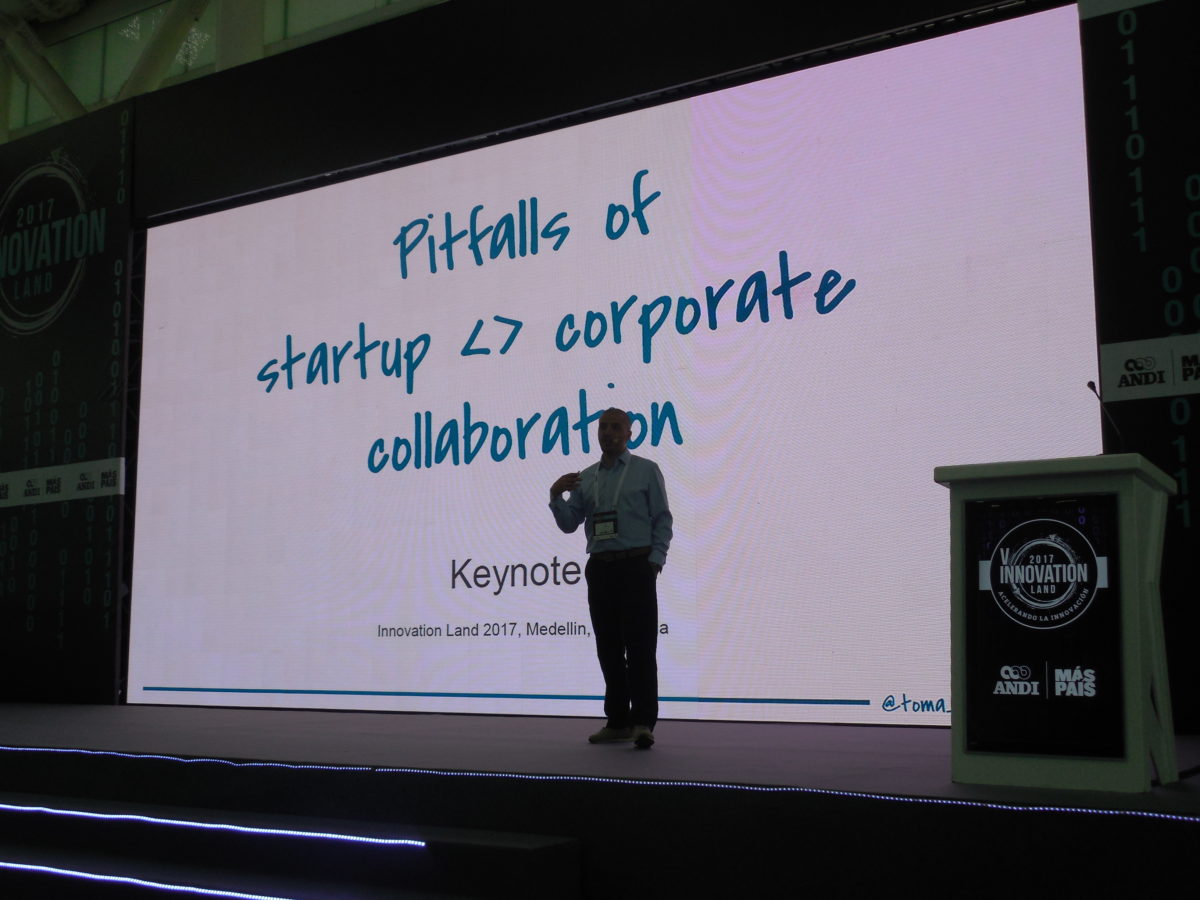As Innovation Land 2017 in Medellin, Colombia winds-down Friday, we take a look at how startup and corporate collaborations can fail before they start, according to a presentation by Dan Toma, co-author of “The Corporate Startup.”

Dan Toma presenting at Innovation Land 2017 in Medellin, Colombia
To begin let’s take a look at what both startups and corporations are looking for when they collaborate. According to Toma, corporations look to these collaborations because startups have lower costs, access to knowhow, they increase the speed of innovation while exploring new trends, and they have a competitive advantage.
So, what do startups get out of a corporate collaboration?
For starters, startups receive the reputation and marketing power of the corporations they collaborate with, but they also receive access to channels, resources, and of course! direct revenue.
These would be the ideal benefits for both parties with a collaboration between startups and corporations; however, according to Toma, there are at least seven ways these collaborations can fail before they even begin, and many are overlooked until it is too late.
1) Having only one contact person (or department) from corporate that works with startups
The Problem: What happens when the contact person changes position for whatever reason? This person could be promoted, transferred, fired, ill, or out on maternity or paternity leave. If this happens, the entire portfolio of startups the person worked with is going to die, and all the money spent developing relationships is gone.
The Solution: Always asks for at least two points of contact at the negotiating table.
2) Startups aren’t always clear about where they are with their technology
The Problem: Since startups are always pushing for innovation, sometimes their assumptions about how far along their technology is is lost in their ambitions for growth. This could mean not knowing whether they have just a concept, a prototype, or they simply forget where they are in development.
The Solution: Come up with some sort of “Technology Readiness Level (TRL)” to assess where you are with your technology. Toma gave an example of what NASA developed in the 1960s which is still being used today by the Department of Defense. Instead of going into the full details here, you may check out NASA’s TRL here.
3) Startups have an unclear knowledge-to-assumption ratio
The Problem: Startups are famous for their risk-taking behavior, but sometimes that behavior can go awry when they don’t know how much they know vs how much they assume.
The Solution: According to Toma and “The Corporate Startup” co-author Tendayi Viki on Medium:
“The ultimate goal of a business venture that is searching for sustainable business model is reducing the amount of non-validated vs. validated assumptions in their business model. The closer to 1 this ratio is, the better. This because a ratio of 1 means that all assumptions within the business have been validated.
Indeed, for startups, a knowledge-to-assumption ratio equaling 1 will result in a very favorable investment valuation. In other words, an entrepreneur keeps more of his company if the investment risk is minimal (knowledge-to-assumption ratio close to 1), whereas investors demand more equity from risky ventures. As such, from a governance perspective, the knowledge-to-assumption ratio informs management about how close a business venture is to product-market fit and whether further investment is justified.”
4) Not having a clear mandate or innovation thesis from corporate
The Problem: In his presentation Toma likened the corporate and startup relationship to parents going to a candy store with their children; the plan is to buy candy, but once the doors to the shop open, they are overwhelmed by the variety and selection. This is like a representative from Boeing getting excited about a cryptocurrency startup. Sure, the startup could be sweet and tempting, but is it really a good fit?
The Solution: Come up with a clear innovation thesis, so that everyone is on the same page. An innovation thesis sets boundaries, rules for specialization, and keeps the main goal in mind. An example would be former US President Kennedy’s moon mission speech. The goal was to get to the moon; not about how to build a rocket.
5) Having an unclear collaboration focus
The Problem: A corporation doesn’t always understand which startups or portfolio would help its core business.
The Solution: Corporate needs to understand what the startups actually do and what their limitations are. If they start negotiating with the wrong startups, corporations lose time and energy while startups get screwed because they lose their funding.
6) Lacking a clear collaboration type
The Problem: When a collaboration type is not defined, many problems can result. For instance, do you know if the collaboration is a payed trial, demonstration, free trial, a purchase order, an acquisition, or an investment?
The Solution: Both startups and corporations need to agree and align expectations on collaboration. What exactly will each party work on?
7) Having an unclear technology integration criteria
The Problem: Corporations don’t understand how a startup’s technology works, nor how its infrastructure is designed, so compatibility becomes an issue.
The Solution: Corporate needs to know how startups’ infrastructure works so that it can be adapted and scalable with corporate needs. Many times this isn’t brought up until collaboration contract is signed, and this spells disaster from a company.
After collaboration begins
Toma went on to list five more points on how collaboration can fail once it begins, which will be beyond the scope of this article but will be explored in an upcoming one, so stay tuned.
Innovation Land 2017 in Medellin, Colombia was organized by ANDI, and if you ever visit the “City of Eternal Spring” and attend an event hosted by ANDI, Jonathan is your point of contact for making connections and getting things done!












